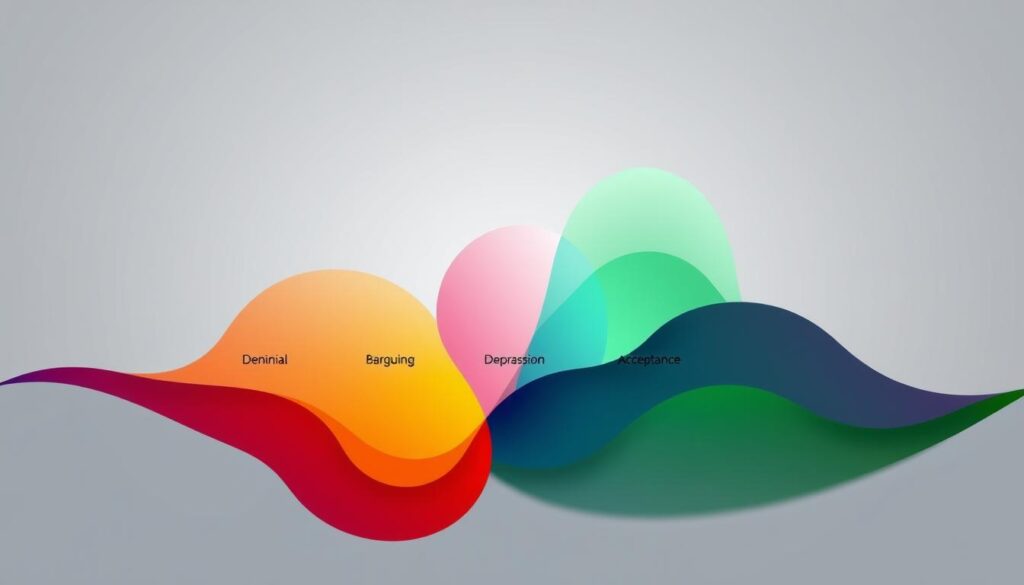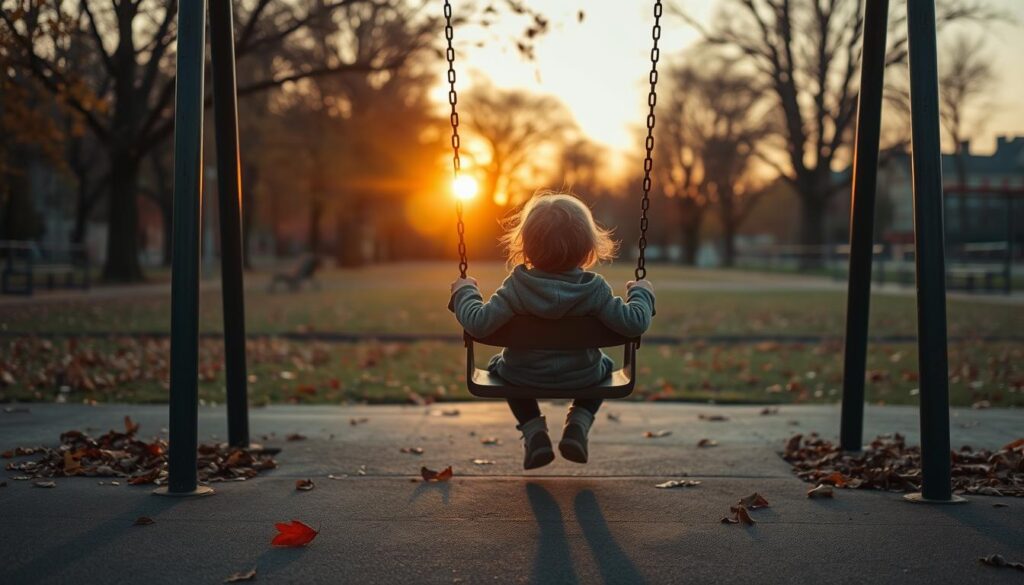Grief is a heavy weight felt when you lose someone dear. It echoes in your heart and mind, feeling both familiar and strange. You might be swamped with emotions like shock, sadness, guilt, and anger. These feelings come and go, leaving you feeling empty.
Research shows about 85% of people feel deep sadness after losing someone close. They feel as if they’re floating in a sea of grief. Remember, there’s no set time to get through grief. For some, healing starts in weeks. For others, it takes years.
The path to overcoming loss is not straight. It’s a personal journey tied to the importance of the lost relationship. But in that pain, there’s a chance to heal. This may come through treasuring memories or getting support from those who understand your loss. On this journey, know you’re not alone. We’re here to delve into this shared experience.
Key Takeaways
- Grief triggers an emotional response, often manifesting in shock, sadness, and anger.
- Approximately 85% of individuals grapple with profound sadness following the loss of a loved one.
- The grief journey is unique; some heal within weeks, while others may take years.
- Overcoming loss involves finding meaning and support during the healing process.
- Social support can significantly reduce feelings of isolation during grieving.
Understanding Grief
Grief is a deep emotional reaction to loss that can change how you see life and relationships. It’s important to know that grief affects everyone differently. This is due to the unique bond we had with who we lost. The time and complexity of grieving can vary a lot, showing why it’s crucial to understand its different aspects.
What is Grief?
Grief comes from loss. This could be the death of someone close or a major change in life. The way we grieve shows the special relationship we had with the person who is gone. While grieving, you might feel sad, angry, or even in disbelief. These feelings can cause you to bounce between facing your grief and wanting to escape it.
Physical and Emotional Symptoms of Grief
It’s important to know the signs of grief to manage this tough time. Common symptoms are:
- Emotional symptoms: feeling sad, anxious, guilty, angry, or nothing at all
- Physical symptoms: being tired, eating less or more, not sleeping well, and having other health problems
Knowing these signs helps you cope better. Often, there’s pressure to get over grief quickly. But studies show our emotional ties last longer than we think. Grief becomes part of our daily life, not something that just ends. Accepting this can help us heal emotionally in a healthier way.
| Symptom Type | Examples |
|---|---|
| Emotional | Sadness, anger, guilt, anxiety, numbness |
| Physical | Fatigue, changes in appetite, sleep disturbances |
| Social | Pulling away from friends and family, not wanting to do things |
| Cognitive | Having a hard time focusing, forgetting things |
Seeing all the different signs of grief helps make your feelings valid. It creates a supportive space where healing can start. Knowing more about this path lets you handle your personal loss better.
Common Types of Loss
Knowing the different types of grief is key for anyone dealing with tough emotions from loss. Grief isn’t just about the death of someone close. Other losses can also make us feel deep sorrow. Recognizing these types helps us understand our feelings and those of others better.
Loss of a Loved One
Losing someone you care about deeply is an intense type of grief. This kind often stirs up mixed feelings, especially if the relationship was complex. About half of people say they face complicated grief if their relationship with the deceased was difficult.
Additionally, about 70% of folks in bereavement groups talk about unresolved conflicts being a big issue in their grief.
Other Sources of Grief
Grief doesn’t just come from losing a person. Big life changes can also cause it. Some examples include:
- Death of a pet
- Divorce or breakup
- Job loss
- Relocation or retirement
Nearly 65% of people feel they don’t get enough support from friends and family when dealing with tough relationships. This often leads to feeling alone. This can make grief pile up, especially for older people. It shows that grief can come from unexpected losses one after another, raising stress levels.

| Type of Loss | Description | Statistics |
|---|---|---|
| Loss of a Loved One | Intense grief stemming from the death of a person close to you. | 50% report complicated grief. |
| Death of a Pet | Can evoke deep emotional pain, often underestimated. | Varies widely in individual experiences. |
| Divorce or Breakup | Significant emotional upheaval similar to bereavement. | Studies show ongoing grief in many post-separation. |
| Job Loss | Loss of purpose and security leading to feelings of grief. | Impact felt by many, especially long-term employees. |
| Relocation or Retirement | Loss of community and routine can trigger grief-like feelings. | Commonly experienced, especially in later stages of life. |
Understanding these losses and how they make us feel can lead to healing. Knowing many others feel the same helps us find community and support on this path.
The Grieving Process
Grieving is a deeply personal journey. How long it lasts varies from person to person. It’s key to understand that grieving doesn’t follow a strict timeline. Grief can last indefinitely, and many factors influence how we feel and for how long.
How Long Does Grieving Last?
Grief doesn’t have a set time frame. Typically, acute grief may last around six months. However, for some, it stretches over years. Healing timelines can change, bouncing between intense sadness and periods of acceptance. Studies show about 40% of people see their grief lessen after a year of processing emotions.
What impacts how long grief lasts? Here are a few factors:
- The relationship to the deceased
- Cultural and religious mourning practices
- Personal coping skills and support networks
Unique Experiences of Grief
No two people grieve in the same way. While stages of grief have been mapped out, they don’t always happen in order. Someone might feel denial, anger, and acceptance all at once or revisit past emotions. It turns out, about 70% of us grieve in unexpected ways.
Healing can come from engaging with our grief. Taking part in activities like volunteering or being creative helps. These approaches help over 75% of those in mourning find meaning. Active involvement in dealing with our loss is crucial for healing.
Remember, your grief journey is valid and unique. It’s okay to feel and express your emotions as you find your own path forward.

Myths and Facts About Grieving
Grief touches everyone in their own way. Many grief myths lead to wrong ideas about mourning. It’s key to know these myths to help acknowledge grief properly. Clearing up these false beliefs lets people openly share their grief.
Dispelling Common Misconceptions
There are many wrong ideas about what “normal” grief looks like. The five stages of grief came from studies on the terminally ill, not those who are grieving someone’s death. Experts now know that grief doesn’t fit into neat stages because it’s more complex.
- Grief comes with any major loss, like the death of someone close or big life changes.
- Not everyone cries; grief can make some feel too numb for tears.
- How men and women show grief can differ because of what society expects.
- Grief can mix with both happy and sad moments, making it more complicated.
The Importance of Acknowledging Pain
Ignoring the pain of losing someone can slow healing. It’s crucial to acknowledge grief. Some believe that to move on, they must forget their grief. But, life after loss usually means learning to live with that grief. Emotions can change over time, with reminders of the loss popping up years later. Especially on important dates, strong feelings can return, reminiscent of the early days of grief.
Understanding these aspects helps people look for support and find healthy ways to cope. Seeing grief as a normal part of life enables better ways to deal with loss. It also helps in connecting with others feeling similar grief.

The 5 Stages of Grief
Learning about the Kübler-Ross model helps us understand how we mourn. Elisabeth Kübler-Ross created it in 1969. It shows five stages of grief: denial, anger, bargaining, depression, and acceptance. Remember, grieving is not straightforward. Instead, it’s like a roller coaster, with feelings intertwining and changing, showing how unique each person’s journey is.
Understanding Kübler-Ross’s Model
The acronym DABDA makes remembering the five grief stages easy. These ideas were first presented in On Death and Dying. It was initially about people facing their own death. While many people go through all five stages, everyone’s experience is different. Some might go through the stages in a different order or revisit some. Today, we know grieving is more like a cycle, where stages can repeat.
Individual Variations in Grief Stages
Everyone’s grief is unique, leading to different ways of dealing with loss. Around 60% of people feel they haven’t fully accepted their loss, even after years. Many find it hard to move past the depression stage. This shows how much we need support when we’re grieving. Things like personal history, the kind of loss, and how resilient a person can impact their grief. Understanding these differences helps us grasp our emotions better and aids in healing.

Coping Mechanisms During Grief
Going through grief brings unique challenges. Finding ways to cope can really help ease this tough time. Taking care of yourself while grieving is key. It helps manage sorrow and boosts overall well-being. Knowing the different ways to handle grief can change how you deal with your emotions.
Healthy Ways to Cope with Grief
Loss often brings confusion and strong emotions. Coping means taking care of yourself while also dealing with the loss. Some strategies that help are:
- It’s okay to feel sad, guilty, or any emotion. Allow yourself to grieve.
- Talking to friends or family about your grief can be comforting.
- Think about getting help from a grief counselor. It can aid in coping healthily.
Self-Care Strategies
Self-care is very important when grieving. Many times, people forget to look after themselves. Here are some easy but effective ways to take care of yourself:
- Get enough rest. Most people who are grieving feel very tired.
- Being active helps fight off the tired feeling.
- Eating well is important for your body and mind.

Everyone’s journey through grief is different. Some may take longer than others. Accepting your emotions and being kind to yourself helps with healing. While it’s normal to feel guilty or confused, understanding these are common reactions can make a difference.
| Symptom | % of Grievers Affected |
|---|---|
| Shock and confusion | 70% |
| Physical symptoms (e.g., lightheadedness) | 60% |
| Emotional numbness or dissociation | 75% |
| Yearning for the deceased | 68% |
| Fatigue and lethargy | 85% |
Finding Support in Grief
When you’re grieving, getting support is key to healing. You need friends and family to help you through. It’s also crucial to know when professional help is needed for the best support.
Building a Support Network
Loss can change your circle of friends. Some may pull back, while others become your rock. It’s vital to keep close to those who truly care and understand. Supportive friends can help you feel connected without feeling too much pressure. Just a simple call to check in can mean the world.
- Stay close to empathetic friends who listen without judgment.
- Engage in grief support groups, which have shown to reduce feelings of isolation by 40%.
- Share your feelings with others; approximately 80% have found it helps in reducing feelings of loneliness.
Seeking Professional Help
If grief overwhelms you, look for professional help. Grief counselors are there for you, especially if your grief is complex. About half of people dealing with loss struggle with daily tasks for months. Professional help can ease you through these tough emotions.
| Type of Support | Benefits | Statistics |
|---|---|---|
| Friends and Family | Emotional connection, non-judgmental listening | 80% find sharing grief reduces isolation |
| Support Groups | Shared experiences, sense of community | 75% report improvements in coping after 3 months |
| Professional Counselors | Specialized grief strategies, personal coping techniques | 3 out of 4 clients feel significantly better with counseling |

During tough times, knowing when to seek help is essential. A mix of personal and professional support can pave the way to healing and emotional strength.
The Truth Over Grief: Can You Ever Really Get Over Losing a Loved One?
Understanding grief means knowing everyone heals in their own way. It’s not about forgetting a lost loved one. It’s about remembering them in ways that let us live on. This journey can be complex, requiring patience and support from others.
Moving Forward Without Forgetting
It’s critical to realize we can move on while keeping memories alive. Many feel alone after losing someone, with about 70% feeling isolated. By forming rituals, we maintain connections to those passed away, which helps 40% cope better. Openly grieving can cut down bitterness and anger by half. It’s a path that allows healing as we continue to honor their memory.
Integrating Loss into Your Life
The process of making loss a part of your life can span 18 months to 3 years. The journey varies greatly, shaped by the bond with the departed and how one copes. Joining support groups can be beneficial. In these groups, 82% feel more connected, finding solace and emotional recovery. Listening to your emotions is crucial. Safe spaces for mourning can greatly ease emotional pain. Acknowledging grief, within supportive settings, boosts emotional well-being.

Understanding Complicated Grief
Complicated grief happens when loss brings on lasting, intense feelings. These feelings disrupt how you live. It’s key to know the signs of this grief. That way, you realize when it’s time to get help. This step is important for feeling better spiritually.
Recognizing Prolonged Grief Reactions
About 10-20% of people grieving face complicated grief. This includes symptoms that last over six months, such as:
- Intense missing of the person who died
- Trouble accepting they’re gone
- Feeling empty or that life has no meaning
- Strong mood changes and worry
- Staying alone and not wanting to do anything
Losing a child is incredibly painful, with risks of depression and anxiety. This despair can stick around for almost ten years. Sudden or traumatic deaths, like suicides, greatly raise complicated grief chances, sometimes over 30%. These points highlight how complex grief is and why understanding it matters.
When to Seek Help for Complicated Grief
It’s tough knowing when to get help. Here are signs you might need to see an expert:
| Signs You May Need Help | Recommended Actions |
|---|---|
| Feelings of despair that interfere with daily activities | Consult a therapist specializing in grief |
| Intense longing for the deceased that disrupts everyday life | Join a support group for bereaved individuals |
| Physical symptoms like fatigue or illness after the loss | Seek holistic treatment combining both physical and emotional support |
| Feeling isolated and unsupported | Reach out for community help |
Research shows about 70% of those with complicated grief find relief through professional help. If you’re seeing these signs in yourself, don’t wait. Reaching out is a big step towards healing and adapting after a loss.

Grieving Children and Family Dynamics
Child grief is hard for kids and their families alike. Kids may act differently than adults when dealing with loss. This can change how they grow emotionally and mentally. Recognizing these differences is key to keeping a family strong after losing someone.
As families deal with grief, they often find their roles and relationships shifting. This can make it hard for them to support each other during such a tough time.
The Impact of Loss on Children
Loss hits kids hard, making them feel alone and not understood. About 1 in 5 kids will lose a loved one before they grow up. Studies show that these kids might struggle with mental health more than their friends, with a chance 50% higher. Many grieving kids feel lonely, and 60% wish for more help in handling their sorrow.
Understanding how kids see grief is crucial. This is because almost 80% of them see it differently than adults do.
Adjusting Family Relationships After a Loss
After a loss, families often see big changes in how they interact. Around 75% of people grieving say that different ways of grieving can cause confusion and disappointment. Talking to each other is very important during these times. It’s been found that 70% of families have a hard time because everyone grieves at their own pace.
It gets even tougher since family members have their own lives. This includes work and looking after kids. So, adjusting to a new way of living without a loved one can add more stress.

| Grief Impact on Children | Statistics |
|---|---|
| Percentage of children experiencing increased mental health risks | 50% |
| Children feeling pressure to “move on” within the first year | 80% |
| Adolescents wishing for more support | 80% |
| Academic performance disruptions in bereaved kids | 46% |
| Percentage of changes in family dynamics | 25% |
Mourning the Loss of a Spouse or Partner
Losing your spouse or partner changes everything about your daily life. Suddenly, you’re doing tasks alone and feeling very alone without them. Becoming a widow or widower means facing new difficulties, especially feeling lonelier than before.
Managing Everyday Tasks Alone
Dealing with the loss of your spouse can make even small chores seem too hard. Nearly half of the people who lose their spouses feel they lose their purpose too. Tasks like cooking or handling money remind you of your loss. Finding ways to manage these tasks can lessen the load. It helps to ask for help or set up routines to make these duties easier. Support from friends or community groups can be really helpful during this tough time.
Facing Loneliness and Fear
Feeling lonely is a big problem for those grieving. About 60% of people who have lost someone feel very alone, especially on important days. It’s scary thinking about the future without your partner. It’s important to talk about how you’re feeling; around 70% say they lost friends too. Joining groups, talking to friends, or seeing a counselor can help you not feel so lonely or scared.

Conclusion
Walking through grief is deeply personal. Everyone’s experience is unique, filled with highs and lows. To deal with loss, we must remember: healing takes time but is achievable.
Healing starts by facing our feelings head-on. Whether it’s denial or acceptance, understanding our emotions is key. This understanding lays the foundation for our emotional recovery.
Remembering the good times with our loved ones helps us move forward. Yet, it’s natural to feel angry or sad about the loss. Facing these feelings and talking about them helps reduce the pain.
It’s also crucial to find support. Talking with friends, going to therapy, or attending memorials lessens our loneliness. Joining a group can make a big difference, with many finding 80% improvement in how they handle sadness.
The road ahead will have its challenges. But holding onto positive memories and seeking help is important. Rely on those who care for you and healthy ways of coping.
You’re not on this journey alone. Many are walking the same path. And there’s always hope for happier times in the future.









